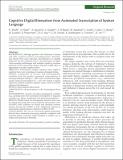Cognitive Digital Biomarkers from Automated Transcription of Spoken Language
Author(s)
Tavabi, N.; Stück, D.; Signorini, A.; Karjadi, C.; Hanai, T. A.; Sandoval, M.; Lemke, C.; Glass, J.; Hardy, S.; Lavallee, M.; Wasserman, B.; Ang, T. F. A.; Nowak, C. M.; Kainkaryam, R.; Foschini, L.; Au, Rhoda; ... Show more Show less
Download42414_2022_Article_266.pdf (3.369Mb)
Publisher with Creative Commons License
Publisher with Creative Commons License
Creative Commons Attribution
Terms of use
Metadata
Show full item recordAbstract
Abstract
Background
Although patients with Alzheimer’s disease and other cognitive-related neurodegenerative disorders may benefit from early detection, development of a reliable diagnostic test has remained elusive. The penetration of digital voice-recording technologies and multiple cognitive processes deployed when constructing spoken responses might offer an opportunity to predict cognitive status.
Objective
To determine whether cognitive status might be predicted from voice recordings of neuropsychological testing
Design
Comparison of acoustic and (para)linguistic variables from low-quality automated transcriptions of neuropsychological testing (n = 200) versus variables from high-quality manual transcriptions (n = 127). We trained a logistic regression classifier to predict cognitive status, which was tested against actual diagnoses.
Setting
Observational cohort study.
Participants
146 participants in the Framingham Heart Study.
Measurements
Acoustic and either paralinguistic variables (e.g., speaking time) from automated transcriptions or linguistic variables (e.g., phrase complexity) from manual transcriptions.
Results
Models based on demographic features alone were not robust (area under the receiver-operator characteristic curve [AUROC] 0.60). Addition of clinical and standard acoustic features boosted the AUROC to 0.81. Additional inclusion of transcription-related features yielded an AUROC of 0.90.
Conclusions
The use of voice-based digital biomarkers derived from automated processing methods, combined with standard patient screening, might constitute a scalable way to enable early detection of dementia.
Date issued
2022-07-13Department
Massachusetts Institute of Technology. Department of Electrical Engineering and Computer Science; Massachusetts Institute of Technology. Computer Science and Artificial Intelligence LaboratoryPublisher
Springer International Publishing
Citation
Tavabi, N., Stück, D., Signorini, A., Karjadi, C., Hanai, T. A. et al. 2022. "Cognitive Digital Biomarkers from Automated Transcription of Spoken Language."
Version: Final published version